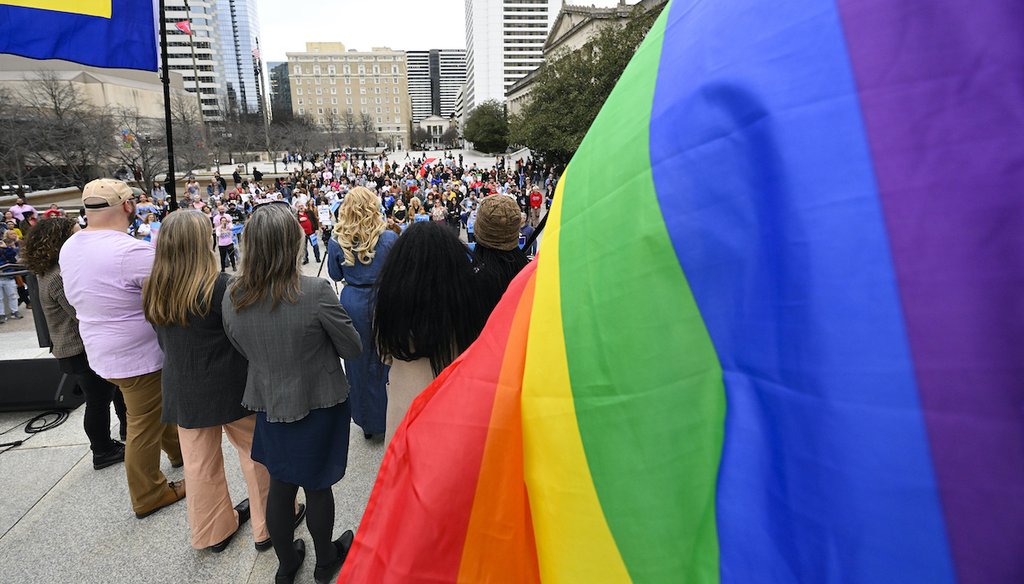Stand up for the facts!
Our only agenda is to publish the truth so you can be an informed participant in democracy.
We need your help.
I would like to contribute

Drag entertainer DeeDee speaks during a news conference held by the Human Rights Campaign to draw attention to anti-drag bills in the Tennessee legislature, on Tuesday, Feb. 14, 2023 in Nashville, Tenn. (AP)
If Your Time is short
-
Tennessee’s new law restricts “adult-oriented performances that are harmful to minors” and that “feature topless dancers, go-go dancers, exotic dancers, strippers, male or female impersonators, or similar entertainers.”
-
Although the law does not mention drag performers or transgender people, the law’s critics say it could be misused to target these communities.
-
Observers say the law is likely to be challenged in court and that the U.S. Constitution’s First and 14th amendments offer transgender people protections.
As Tennessee’s governor signed into law a bill that aims to restrict some drag performances, online rhetoric muddied the known scope and impact of the legislation.
The measure, signed March 2 by Republican Gov. Bill Lee, bans "adult cabaret performances" on public property or in front of children. Under state law, those performances include male or female impersonators.
The law does not explicitly mention drag performers or transgender people, but critics of the measure say these communities likely will be targeted if the ban goes into effect.
"It’s now illegal to be publicly trans in Tennessee, under the guise of a drag ban," wrote one Instagram user Feb. 24.
"Legal bans on drag are just an easier way to pass laws (to) make being trans/GNC (gender nonconforming) in public illegal," a Feb. 26 post on Facebook said.
The posts were flagged as part of Facebook’s efforts to combat false news and misinformation on its News Feed. (Read more about our partnership with Meta, which owns Facebook and Instagram.)
LGBTQ advocates are concerned that the law could be misused to prosecute transgender people and wonder whether it could be used to target people for participating in Pride parades.
Experts we reached said the law is likely to be challenged in court, where critics will argue it infringes on existing civil liberties.
Tennessee’s American Civil Liberties Union told us the law does not make it illegal to be publicly transgender. And other legal experts told us the biggest protection trans people have is the U.S. Constitution.
Tennessee is the first state in recent history to adopt a ban of this kind. So far this year, more than 30 bills restricting drag performances have been introduced across 16 states, according to the national ACLU, which is tracking this legislation. Many of these bills use similar language.
An aide to one of the legislation’s lead sponsors countered the notion that it targets transgender people. The law’s purpose is to regulate and prevent children from viewing "sexually obscene performances," said Luke Gustafson, senior policy adviser to Republican state Senate Majority Leader Jack Johnson.
But the measure is part of a larger national wave of what critics characterize as anti-LGBTQ bills. In 2023’s first two months, 340 bills discriminating against the LGBTQ community were introduced in state legislatures nationwide, according to the Human Rights Campaign. That's compared with 315 bills in all of 2022, when 29 became law.
Tennessee’s law makes it a criminal offense for someone to engage in an "adult cabaret performance" on public property or in a place where children could see the performance.
Tennessee law defines "adult cabaret" as "adult-oriented performances that are harmful to minors" and that "feature topless dancers, go-go dancers, exotic dancers, strippers, male or female impersonators, or similar entertainers."
A first offense would be charged as a misdemeanor, and conviction could result in less than a year in prison, a fine of up to $2,500 or both. Any subsequent offenses would be charged as a felony, which, if convicted, could lead to between one and six years in prison and a fine of up to $3,000.
It is set to go into effect April 1.
The measure does not appear to prohibit any conduct that would not already be illegal under Tennessee’s obscenity law, said Andrew Ortiz, a staff attorney for the Transgender Law Center. But he said there are "legitimate, serious concerns about how the law will be applied and enforced."
"It’s unclear what conduct would run afoul of the proposed law that isn’t already prohibited under the obscenity laws and could be criminalized without facing significant constitutionality issues," Ortiz said.
The law’s effects will not be clear until a court rules on the issue, said Wendy Bach, a University of Tennessee law professor. For instance, she said, a prosecutor could try to use the ban to prosecute a transgender person for participating in a Pride parade.
Pride parades commonly draw families and feature celebratory dancing by adults wearing drag. Could someone who doesn’t like what they observe argue that this is a violation of the law?
Experts are divided and cautious.
"It would really depend on the facts, but in a case like that the defense might have a strong argument that what that particular person did was not ‘adult cabaret entertainment,’" Bach said. "But, again, we won’t know until a prosecutor attempts such a prosecution, it is challenged by the defense, and a court rules."
Johnson, Tennessee’s Senate majority leader, and state Rep. Chris Todd, both Republicans, have said the legislation’s intent is protecting Tennessean children.
The claim that this measure would make being publicly transgender illegal is "patently false," Gustafson, Johnson’s adviser, told PolitiFact. "This bill has nothing to do with the way someone dresses or identifies and only with the performance of adult-oriented entertainment."
Transgender rights advocates Erin Reed and Allison Chapman have been tracking hundreds of LGBTQ bills introduced this year. They argue the Tennessee legislation targets not only drag performers, but also transgender people.
The law leaves undefined "male and female impersonators" and state lawmakers often conflate people in drag and transgender people, Reed said.
Kathy Sinback, executive director of ACLU’s Tennessee chapter, said the law does not on its face threaten trans people.
"The legal definition for ‘harmful to minors’ in Tennessee is very narrow and only covers extreme sexual or violent content with no artistic value," she said. "Trans people existing in public spaces and drag performers do not fall into this category.
We are concerned that government officials could easily abuse SB 3/HB 9 to censor people based on their own subjective viewpoints of what they deem appropriate."
Organizers of Tennessee’s annual Knoxville Pride Festival and parade have threatened they may cancel the organization’s October festivities in response to the law.
But Ezra Young, a constitutional law scholar at Cornell University, said he doesn’t believe the Tennessee drag show ban could legally be used to arrest a transgender person in drag at a Pride parade. That’s because the ban amends a 1998 Tennessee law on state standards for regulating certain kinds of adult businesses, which usually means places such as strip clubs, liquor stores and bars.
"A public parade?" he said. "No, that would not be it."
There is no federal law that specifically bans discrimination based on sexual orientation or gender identity, and transgender rights vary from state to state.
But the U.S. Constitution’s First and 14th Amendments are sure to come into play in any legal challenge, legal experts told us.
The First Amendment protects everyone’s right to freedom of expression and association; the 14th Amendment restricts the government’s ability to target groups and treat them unequally.
More specific protection also came in 2020, when the Supreme Court held that title VII’s employment protections extended to transgender people. On the day he was sworn in, President Joe Biden signed an executive order that aimed to prevent and combat discrimination based on gender identity or sexual orientation. All of these steps help bolster the federal protections that already exist, law experts said.
Even without these measures, constitutional law experts said the Tennessee ban does not give the government the power to make it illegal for a transgender person to exist in public.
"They have no such powers. There is no sensible meaning of the Constitution or jurisprudence that would give any government the power to make it impossible for a trans person to exist in society," Young said. "Sometimes the government passes laws they don't have the power to pass, and that's what courts are for. There are certain powers that people retain in the U.S., and there's no exceptions if you're transgender."
Our Sources
Email interview, Luke Gustafson, senior policy adviser for Tennessee Senate Majority Leader Jack Johnson, March 1, 2023
Email interview, Allison Chapman, independent legislative researcher, March 2, 2023
Email interview, Erin Reed, independent legislative researcher, March 2, 2023
Email interview, Wendy Bach, law professor at the University of Tennessee, March 2, 2023
Email interview, Andrew Ortiz, staff attorney for the Transgender Law Center, March 2, 2023
Email interview, ACLU Tennessee, March 2, 2023
Phone interview, Ezra Young, scholar of constitutional law at Cornell University, March 6, 2023
Phone interview, Sasha Buchert director of the non-binary and gender rights project and senior attorney at Lambda Legal, March 6, 2023
Tennessee General Assembly, SB0003, March 2, 2023
Instagram post, Feb. 24, 2023
Facebook post, Feb. 26, 2023
Tweet, Feb. 28, 2023
Tweet, Feb. 27, 2023
Tweet, Sept. 26, 2023
Tweet, Sept. 24, 2023
Tennessee Statute, Obscenity law, accessed March 2, 2023
Tennessee Statute, Authorized terms of imprisonment and fines for felonies and misdemeanors, accessed March 2, 2023
American Civil Liberties Union, "Mapping Attacks on LGBTQ Rights in U.S. State Legislatures," Feb. 28, 2023
LGBTQ+ Legislative Tracking Google Spreadsheet, accessed March 2, 2023
The Tennessean, "Tennessee passes controversial drag show bill," Feb. 23, 2023
The Tennessean, "Gov. Bill Lee will sign drag bill, reacts to yearbook photo showing him dressed as a woman," Feb. 27, 2023
NBC News, "Tennessee takes lead in Republican effort to restrict drag shows," Feb. 23, 2023
PEN America, "Laws Restricting Drag Shows Should Scare Everyone Who Believes In Free Expression," Jan. 19, 2023
Human Rights Campaign, "Human Rights Campaign Condemns Tennessee House for Passing Discriminatory Anti-Drag Bill and Gender Affirming Care Ban; Urges Governor Lee to Veto," Feb. 23, 2023
Center for American Progress, Beyond Bostock: The Future of LGBTQ Civil Rights, August 26, 2020
WhiteHouse.gov, Executive Order on Preventing and Combating Discrimination on the Basis of Gender Identity or Sexual Orientation, Jan. 20, 2021
NPR, The anti-drag bills sweeping the U.S. are straight from history's playbook, March 6, 2023
WATE.com, Knox Pride Festival to be cancelled if drag show bill becomes law, Feb. 9, 2023













































